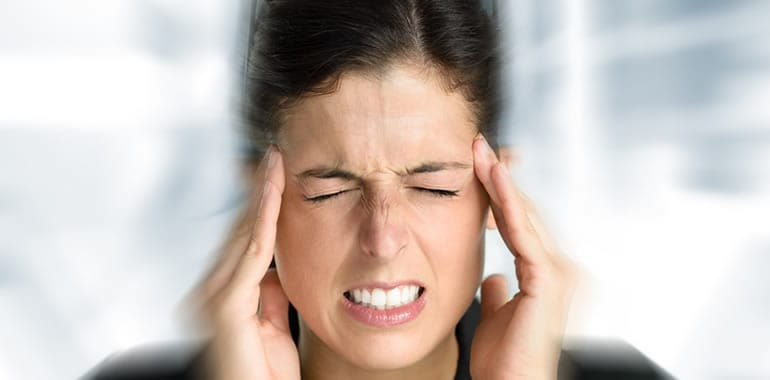Ever been in a foreign country and tried to order off of a long, complicated, alien looking menu? Did you use hand signals to describe the dish you wanted? Did you whip out your phone and hope Google has the answers? And, in the end, did you just close your eyes and trust that what landed on your plate was pork, not pizza? Yes, this situation can be stressful, especially when you don’t end up getting what you want. The same principle can be applied to the body when it is put under undue stress that results in pain.
The Body’s Alarm System
Well, let me tell you a secret… Pain is an alarm system that lets you know there is something wrong. When your body is under stress and in pain, your body is frantically waving hand signals, pointing at pictures, and speaking in a foreign language. Why? Because it needs you to give it what it wants.
Few of us think of pain as a language, and yet, it is. Foreign though it may be to many people, it is, in fact, a very detailed and specific way of communication. When you stub your toe, for example, your brain sends you a signal that something is wrong. You hop around looking sheepish for a while, but you also realize that putting a plaster over the nail, putting your foot up a bit, and wearing shoes next time is the right thing to do. So why would it be different when it comes to chronic pain? Back pains through to knee pains all have one thing in common: they’re ‘alarm’ signals from the body.
And if your body is speaking to you – or screaming at you – it’s time to take some notice. But, that having been said, it’s a little easier said than done sometimes. If you’ve experienced ongoing, debilitating pain, it’s not always easy to listen properly. You might just not understand. And that’s why it’s absolutely vital to take a step back and start looking at the most important factor contributing to your pain: stress.
Physical Stress
For many of us, this five letter word has been so overused we don’t really understand what it means anymore. For some folks, general stress can push them forward, motivating them to challenge their professional and personal boundaries. But others – including many of you reading this now – might not even know what a holiday or ‘me-time’ is anymore. Quite possibly, you (and them) have been so focused on your work, family, or other activities, that you’ve not taken a moment to notice what is ongoing stress. Meanwhile, accumulative stress is contributing to your body pain.
You see, stress is a bit like moving a bucket of water from one end of a football pitch to the other. Continuously. You’re so focused on moving the bucket over the outer boundary that you don’t feel your knees and back giving way. You just keep going. Eventually – inevitably – the water spills and, well, you’re left to clean up the mess.
Yet, what would happen if you set the bucket down? You would decide to reduce stress, begin to slow down, look up at the sky, and start contemplating a trip to the beach. What do I mean? You would start living the life you deserve and, miraculously, your knees and back just might have a chance to recuperate and heal, given that you take actions which facilitate less stress.
What About Emotional Stress?
In the case of emotional stress, too, the concept remains the same. Because the brain processes stress as a trauma, akin in many ways to PTSD, it therefore suffers from the effects of anxiety and stress for a while after the body actually experiences them. Again, this type of stress needs to be dealt with. Action needs to be taken, otherwise the metaphorical stress bucket will always be close to tipping and your body develops ways to ‘work around’ the pain. We call this compensation. Your brain also interprets compensation as a form of stress.
For the most part, people assume that stress comes second to the mind. In reality, a large amount of stress results in mental strain. Of course, this is true. But the effects of stress are even further reaching than that. Demanding, prolonged, adverse situations cause individuals to experience stress, that is, strain placed on the mind, heart, and body. As the mind becomes increasingly agitated and anxious, the body responds accordingly. Muscles begin to tense up, posture suffers, sleep is hard to come by, and the overall function of the body declines.
Stress and Compensation
In compensation, the body creates dysfunctional movement patterns around pain. This is a natural process designed to divert painful motions to surrounding muscles. Causing some muscles to loosen and other muscles to tighten up.This is meant to happen, only, until we can correct the original pain or issue. When this compensation replaces the natural range of motion of the muscles, it becomes the new norm and leads to further dysfunction. Manual physical therapy gets to the root of compensation that leads to more pain and stress when left untreated.
It’s important to note that a knee-injury, for example, doesn’t mean you’re necessarily stressed. Nor does backache or headaches. In fact, stress is notorious for affecting a vast majority of areas around your body that compensate to deal with movements that would otherwise cause pain, rather than one single one. In other words, stress causes a cumulative worsening of symptoms throughout the entire body.
Suffering from stress may cause a few, or all, of the following:
- Back tension
- Headaches/Neck pain
- Jaw pain
- Insomnia
- Back pain from tossing/turning
- Slouching from fatigue
Of course, as one experiences fatigue, so too the stress mounts, thereby worsening the intensity of an already vicious circle. It is not an understatement to say that “stress kills”, as a prolonged period of stress can lead not only to a mental breakdown, but to the deterioration of one’s physical body, so much so that mobility and comfort may be lost. Once again, this will further increase stress.
It’s obvious, then, that recognizing the ways in which stress is entering your life and manifesting in your body is absolutely imperative.
If indications of stress are picked-up early, then the effects can be safely and permanently mitigated: this will ensure that you remain mobile, pain-free, and a lot happier than if you were living with that stress on a daily basis. A stress-free life is interconnected with health, mental peace, and a pain-free life. De-stressing is perhaps the most important thing you can do, right now.
So, how do I deal with stress?
Stress is dangerous, yes, but it is possible to cope with it in healthy, sustainable ways. It’s not only possible, though, it’s an absolute necessity. Allowing stress to build is perhaps one of the leading causes of serious injury, both mentally and physically. We really don’t want you to get to that point.
Please try the following activities in order to cope with any possible stress you’re under:

Visualization & Meditation (even if it is for 5 minutes)
Focus on an item (like a leaf on a plant) , stare at it and keep your focus on that. Your mind will wander but bring your attention back to the leaf. Just 2 minutes of doing this will give your brain a ‘break’ and clear your mind from worry that may be causing your brain to fire rapidly. Check out Joann’s favorite guided meditations. Joann’s favorite meditation app is Insight Timer which can be found HERE. Her favorite guide is Hugh Byrne and there are more to try on the mobile app so you can find your Chi on the go. Let us know how this less stress technique works for you.

Calm Body & Mind
Improve your mind/Body Connection. Lay down with your feet up on the wall. This will increase blood flow with little to no stress on your heart. Elevating your feet triggers a relaxation response (parasympathetic nervous system.) Your body will slow down and your mind will take the relaxation cues from your body to reduce stress. Doing this with a friend will boost the relaxation response (and make you feel a little less silly.)
Journaling
Put your worries down in writing, in no particular order, even if you have to organize them later. It helps to get tasks out of your brain and down on paper so you can focus on the task at hand without feeling stressed about the other activities on that list.
Exercise
Just 30 minutes of activity can be enough to reduce stress. Exercise changes the outlook your brain has on the world around you. Increased endorphins signal to your brain that everything is ok and you will feel great knowing what you have accomplished.
Diet
So few people ever turn to how they fuel their body for answers relating to their chronic pain. And yet, there might be a direct link between the nutritional content of your food and the pain you’re going through. Sugar, fat, and salt all put stress on your body and contribute to the accumulation of a poor metabolism, fat storage in the body, poor blood pressure, and decreased circulation. The result? Pain.
A diet full of Antioxidants protects our cells from disease-causing damage and reduces inflammation in your body. Start including more vegetables and antioxidants into your diet. Include foods that are nutrient dense and well balanced.
To learn more about how diet affects pain, click here
Breathing Techniques
Readjusting your breathing in order to allow more oxygen to enter your bloodstream is vital in balancing out the stress in your life. By practicing tried-and-tested breathing techniques, stress will not be given the opportunity to wreak havoc on either your physical or mental self.
Essential Oils
There’s one very good reason essential oils have been around for thousands of years… they work! Some essential oils are able to reduce stress and induce relaxation. Thus, using them in your bath, in lotions, in diffusers, or even just as something to sniff on occasion, is a really useful way of inviting a sense of calm into your life. Remember, as the mind unwinds, so too your body will be open to heal.
Heat/Ice
The physical effects of stress need to be tackled, too. As stress builds, so too the body may shut down. Remember, therefore, to pay attention to areas of the body that feel less mobile or painful than before. Apply heat or ice to these stressed areas in order to alleviate the discomfort. Thereafter, seek proper treatment from a physical therapist.
Physical Therapy TuneUp
Prolonged periods of stress can oftentimes cause physical pain. Backache, headaches, and neck pain should never be ignored: visit a hands-on physical therapist for the best, safest, most effective way of both treating the physical pain and for tips on how to prevent its resurgence. A physical therapist will not only diagnose the root-cause of the problem and eradicate the pain, but will give you tailor-made exercises so that you can continue your pain-free life outside of the clinic. Once you treat the pain, the mental healing can begin.
At the end of the day, stress is truly detrimental to one’s health, physical well-being, and state of mind. It can rob us of our joy, hobbies, family-time, and active lifestyles. Listen to your body and make time to de-stress. Knowing if you’re stressed, it is absolutely essential in staving off physical pain and mental anguish. If you’re unsure why you’re in pain, you’re worried about your physical health, or you just need some advice about stress-related injuries, then we invite you to contact us, today. No one should live with stress or stress-related pain: let us help you, right now.
Do something to reduce your pain as soon as possible because pain causes stress and then pain causes more stress and after a while, your brain becomes so “used to” pain that the signals become the new norm. A Tune-Up should be done often enough to realign your body back into the symmetry achieved with manual therapy.
Otherwise, the pain in your back, knees, ankles, and so forth, will continue. Your body will continue telling you that something is very wrong with your routine. It’s time to listen.


